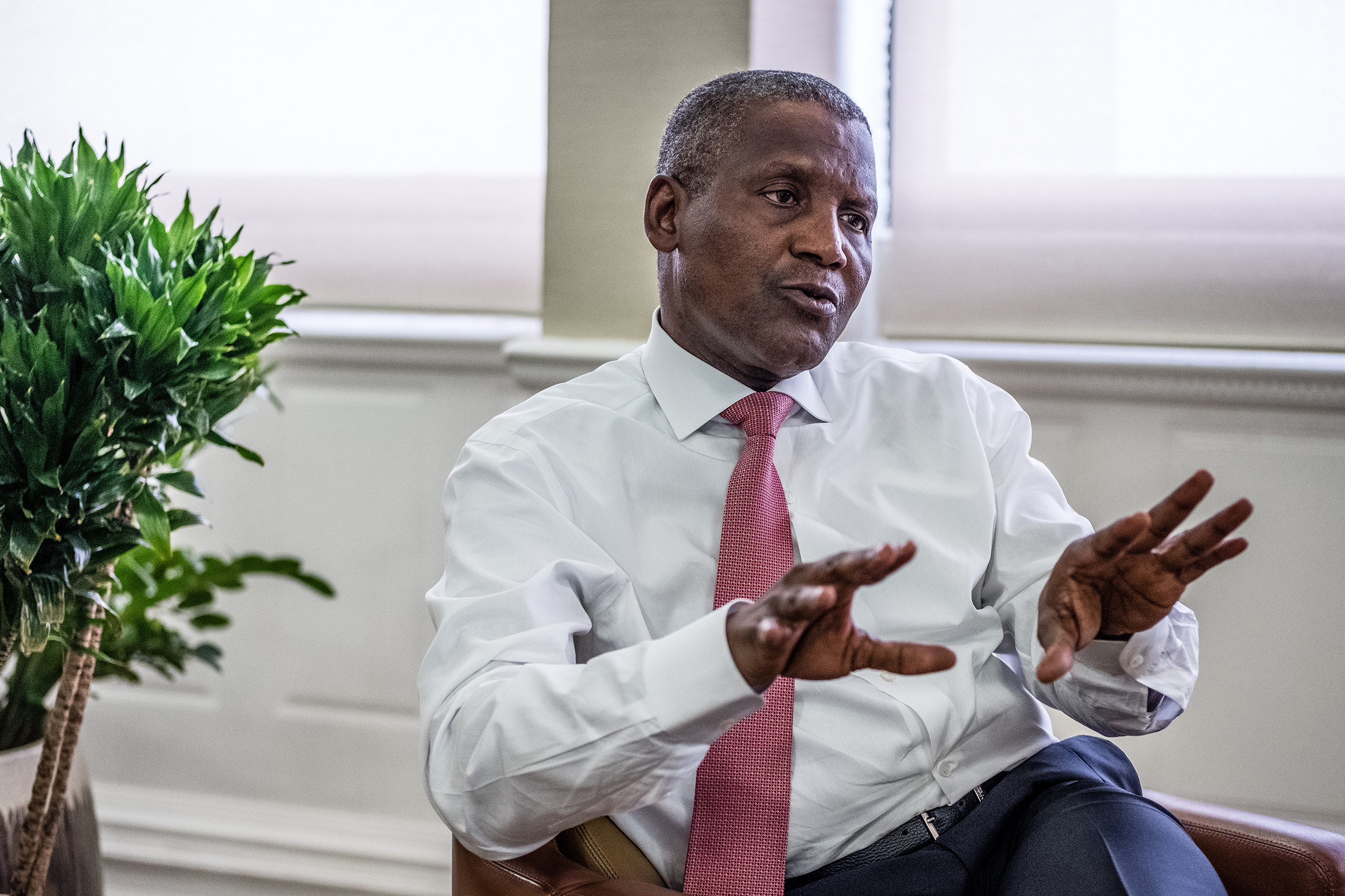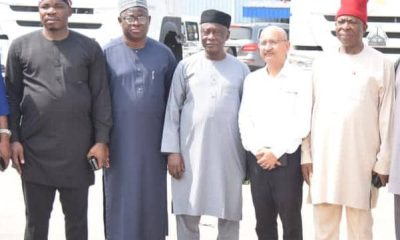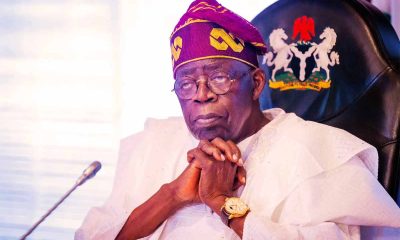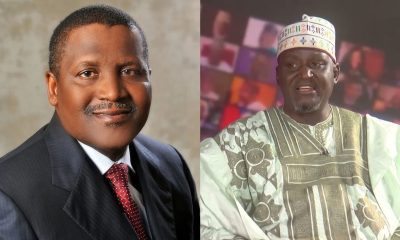Business
FG must end fuel subsidy now, says Dangote

FG must end fuel subsidy now, says Dangote
Alhaji Aliko Dangote, President and Chief Executive of Dangote Group, has called for the complete removal of fuel subsidies in Nigeria.
He believes that ending these subsidies will provide a clearer picture of the country’s actual petrol consumption.
During a recent 26-minute interview with Bloomberg Television in New York, Dangote confirmed his ownership of two oil blocks in the upstream sector, with production expected to commence next month.
He emphasized that fuel production from his $20 billion mega refinery in Lagos, which has the capacity to refine 650,000 barrels of crude oil daily, will significantly alleviate pressure on the naira.
Dangote argued that now is the ideal time to eliminate fuel subsidies, stating that doing so would greatly benefit the economy by reducing reliance on petrol imports and easing currency pressures.
He said, “Subsidy is a very sensitive issue. Once you are subsidising something then people will bloat the price and then the government will end up paying what they are not supposed to be paying. It is the right time to get rid of subsidies.”
“But this refinery will resolve a lot of issues out there, you know, it will show the real consumption of Nigeria, because, you know, nobody can tell you. Some people say 60 million litres of gasoline per day.
“Some say, it’s less. But right now, if you look at it by us producing, everything can be counted. So everything can be accounted for, particularly for most of the trucks or ships that will come to load from us. We are going to put a tracker on them to be sure they are going to take the oil within Nigeria, and that, I think, can help the government save quite a lot of money. I think it is the right time, you know, to remove the subsidy.”
Dangote who recalled the challenges faced after the project’s launch in 2013, experiencing a five-year delay due to issues with state government and host communities and a running loan of $2.4bn, said he is personally proud to achieve the feat.
On whether the subsidy will make the refinery viable, Dangote said, “Well, you see, we have a choice of either one. We produce, we export, and when we produce, we sell locally. But we are a big private company. And yes, it’s true, we have to make a profit. We build something worth $20bn so definitely we have to make money.
READ ALSO:
- Suspect who lured woman to hotel for alleged ritual in FCT police custody
- APC will replicate Edo template in Ondo, Anambra elections – Ganduje
- Be patient to enjoy economic reform benefits, Tinubu tells Nigerians
“The removal of subsidies is totally dependent on the government, not on us. We cannot change the price, but I think the government will have to give up something for something. So I think at the end of the day, this subsidy will have to go.”
President Bola Tinubu removed the subsidy when he took office in May 2023, exacerbating a cost-of-living crisis that sparked protests, but quickly reinstated it as inflation spiked.
Another step to ending it was taken in early September when the gasoline cap was eased — though the price remains below the market level.
Nigeria, until Dangote’s refinery came on stream was fully dependent on imported petroleum products, and has been taking tentative moves to finally end the nation’s pricey fuel subsidies, which in 2022 cost $10bn.
Dangote, who has the option of either exporting his fuel or selling it domestically, said the decision on subsidies was the government’s, but added that ending gasoline imports will have a huge upside in easing currency pressures.
The naira has lost around 70 per cent of its value against the dollar since rules that pegged the currency at an artificially high level were relaxed last year.
But the scarcity of the greenback in the Nigerian foreign exchange market continues to weigh on the naira and is made worse by the need to pay for imported gasoline in dollars.
“Petroleum products consume about 40 per cent of our foreign exchange,” Dangote said, adding that fuel from his refinery, which started supplying gasoline on Sept. 15 to the state-owned oil company for domestic sale, “can actually stabilize the naira.”
Continuing in the interview, the businessman revealed the details of the pricing disagreement that occurred with the Nigerian National Petroleum Company Limited.
He said the national oil company bought its current stock from the refinery at a cheaper price than its imported fuel but gave a uniform price for all products.
“There wasn’t really a disagreement, per se. NNPC bought from us on the 15th of September at the international price, which they also bought, about 800,000 metric tons of gasoline imported. So the one that they bought from us actually is cheaper than the one they are importing.
“And so when they announced our price, the guy, I don’t know whether he was authorized. It wasn’t really the real price. What they have announced is most likely that is what it cost them, including profit and other expenses.
“And then the other one is one that they imported. But the people don’t know how much they spend in terms of imports, but their importation is almost, maybe about 15 per cent more expensive than ours, you know.
READ ALSO:
- 29,000 Yoruba people were killed by herdsmen — Akintoye
- How ex-power minister received N5.2m bribe under Mambilla project – Witness
- UN officials say ‘atrocities must end’ in Gaza
“So what they are supposed to do is to sell at a basket price, or if they want to remove subsidy, they can announce that they will remove subsidy, which is okay, everybody you know will adjust it.”
On the planned crude oil sales anticipated to begin in October, Dangote said that discussions are still ongoing and a detailed agreement will be finalised this week.
Revealing details of the deal, he explained, “We will sell the crude in naira after we have bought in naira. So now we are currently working out with the committee that the exchange rate is going to be priced. It is going to be normal pricing, you know, if crude is at $80, we will pay that price at an agreed exchange rate.
“And then we will also sell in the domestic market. What that will do is that it’s going to remove 40 per cent pressure on the naira. So because, see, the petroleum products consume about 40 per cent of foreign exchange, so you know, and then, you know, it’s like you have 40 per cent of demand been taken out so that can actually stabilize the naira and even if they subsidise, they would know what they are paying for.
“The deal is to give the government something that they want. It’s also a win-win situation for all and it would benefit the country.
“Currently, discussions are still ongoing to determine the details of the agreement. They are working out something that I think would be a win-win between us and the NNPCL.
“The agreement is very robust. Well, first of all, we would have energy security where they will give us crude. For example, in October, they’re going to give us 12 million barrels, which is on average, about 390,000 barrels a day, which will sell both gasoline, diesel, and aviation fuel.”
He also confirmed ownership of two oil blocks in the upstream sector with an expected production date of next month.
Dangote tankers’ park
Meanwhile, the Federal Government has said that it is providing land for interested entities to build an expansive park for tankers lifting petrol and other products from the Dangote refinery.
This followed a routine inspection on Sunday by the Minister of Works, Dave Umahi, who raised concerns about over 3,000 fuel tankers queueing up on the new concrete pavement road.
READ ALSO:
- Israeli air strikes kill 492 people in Lebanon
- Yahaya Bello: Kogi assembly demands removal of EFCC chairman, says he’s incompetent
- Troops eliminate terrorists, rescue hostages in major operations
Umahi noted that though the pavement is made of concrete the current road was not designed to handle static load and may soon deteriorate like the ever-busy Apapa road.
This minister revealed this to State House Correspondents after Monday’s Federal Executive Council meeting at the Aso Rock Villa, Abuja.
He said, “From my inspection yesterday, we discovered that we had over 3,000 fuel trucks queuing for the Dangote fuel lifting, and they were all parked on the newly constructed road.
“Technically and by design, the roads were never built for static loads. And so it has a lot of effects. So, we will have the same thing we had in Apapa that damaged the entire road until it was constructed on concrete.”
“So what FEC approved today is that the land that we have, the Federal Government land, we should put it for concession so that concessionaires would bid and whoever wins will be able to build a park. The park will be tolled so all those trucks can safely park there. And the pavement of such a park is quite different from the pavement of the road.”
Umahi also announced that the council approved various road projects. He said, “The council approved several road projects. One is a new contract for rehabilitating Maraban-Kankara-Funtua Road in Katsina state. The second is the award of a contract for the construction of a 258km three-lane carriageway, a component of the 1,000 Sokoto-Badagry superhighway section two, phase 2A in the Kebbi Section. It is to be done with continuous reinforced concrete pavement. It excludes all bridges and flyovers.
“The third one is the contract for the construction and dualisation of Afikpo-Uturu-Okiwe in Ebony, Abia, and Imo State, Section Two. The next one is the Bodo-Bonny road in Rivers State under Julius Berger. The Federal Executive Council approved an additional N80bn to complete that project, bringing the total cost to N280bn.
“The next is the third mainland bridge. The third mainland Bridge was executed under emergency work. When you have emergency work, you have to get going, measure the work, and send all your measurements and quotations to the BPP. And that’s what we did. So that has been done, and it’s also extended to Falamo and Queens Drive. It also came with solar-powered light. The essence is that all through the length and breadth of the road, the security agencies will be able to check everything happening within the length and breadth of this bridge. And we give response time to respond to any eventuality for 10 minutes. So the contract covers about four security vans and one-speed boat.”
Other contracts include the N158bn contract approved for the Lekki Port service lanes by Dangote Industries, linking Epe to Shagamu-Benin Expressway. The council also approved the N740.79bn Abuja-Kaduna-Zaria-Kano Road re-scoped with solar lighting under a 14-month completion by Julius Berger.
Umahi also named about 14 road projects and bridges affected by floods, including Ado-Ekiti-Afe Babalola in Ekiti State and Lafia-Shendam Road in Plateau State.
FG must end fuel subsidy now, says Dangote
Railway
Lagos Rail Mass Transit part of FG free train ride – NRC

Lagos Rail Mass Transit part of FG free train ride – NRC
The Nigerian Railway Corporation (NRC) has disclosed that the Lagos Rail Mass Transit (LRMT) trains are included in the Federal Government’s free train ride initiative for the Christmas and New Year celebrations.
The LRMT, which currently includes the Phase 1 Blue Line Rail and the Phase 1 of the Red Line Rail, operates under the Lagos Metropolitan Area Transport Authority (LAMATA).
This announcement was made by Ben Iloanusi, the Acting Managing Director of the NRC, during an interview on NTA News TV on Friday, following the launch of the initiative earlier that day.
While Iloanusi stated that Phase 1 of both the Blue Line and Red Line Rail projects are part of the program, LAMATA has yet to confirm this inclusion.
READ ALSO:
- Nigeria denies alleged plot to destabilise Niger Republic
- Navy arrests 19 Nigerians attempting to reach Europe by hiding on ship
- Troops arrest four Ambazonian rebels in Taraba
Iloanusi outlined the other routes benefiting from the scheme, which include the Lagos-Ibadan Train Service, Kaduna-Abuja Train Service, Warri-Itakpe Train Service, Port Harcourt-Aba Train Service, and the Bola Ahmed Tinubu Mass Transit in Lagos. Notably, little was previously known about the Bola Ahmed Tinubu Mass Transit service until this disclosure.
“Let me mention the routes where this free train service is happening. We have the Lagos-Ibadan Train Service, we have the Kaduna-Abuja Train Service, we have the Warri-Itakpe Train Service, we have the Lagos Rail Mass Transit trains, we have the Port Harcourt-Aba Train Service, and we have what we call the Bola Ahmed Tinubu Mass Transit, which is also in Lagos,” he stated.
Iloanusi provided operational updates, stating that passengers nationwide can access free tickets online or, for those unable to do so, at train stations where they will be profiled and validated.
He noted that passengers using NRC-managed services (excluding the Lagos Rail Mass Transit) should reserve tickets via the official website, www.nrc.gov.ng, with a valid ID required. He also advised travelers to plan, arrive on time, and bring valid identification.
Lagos Rail Mass Transit part of FG free train ride – NRC
Business
NNPC denies claim of Port Harcourt refinery shutdown

NNPC denies claim of Port Harcourt refinery shutdown
The Nigerian National Petroleum Company Limited (NNPCL) has denied claims in media reports that the newly refurbished Port Harcourt refinery has shut down.
The national oil company denied the claim in a press release issued by its Chief Corporate Communications Officer, Olufemi Soneye, on Saturday.
Soneye said the claim was false and urged Nigerians to disregard it. He stressed that the Port-Harcourt Refinery is fully operational.
READ ALSO:
- Like Ibadan, stampede claim 10 lives for Abuja Catholic church, 17 in Anambra
- Marketers react after NNPCL slashes petrol price to N899 per litre
- Electricity: We installed 184,507 meters, issued 50 licences in Q3, says FG
The statement read, “The attention of the Nigerian National Petroleum Company Limited (NNPC Ltd.) has been drawn to reports in a section of the media alleging that the Old Port Harcourt Refinery which was re-streamed two months ago has been shut down.
“We wish to clarify that such reports are totally false as the refinery is fully operational as verified a few days ago by former Group Managing Directors of NNPC.”
He noted that preparation for the day’s loading operation is currently ongoing, and added that claims of the shutdown are “figments of the imagination of those who want to create artificial scarcity and rip-off Nigerians.”
NNPC denies claim of Port Harcourt refinery shutdown
Business
CBN permits BDCs to buy up to $25,000 FX weekly from NFEM

CBN permits BDCs to buy up to $25,000 FX weekly from NFEM
The Central Bank of Nigeria (CBN) has granted Bureau de Change (BDC) operators temporary permission to purchase up to $25,000 weekly in foreign exchange (FX) from the Nigerian Foreign Exchange Market (NFEM).
The Central Bank of Nigeria (CBN) has granted Bureau de Change (BDC) operators temporary permission to purchase up to $25,000 weekly in foreign exchange (FX) from the Nigerian Foreign Exchange Market (NFEM).
This move, detailed in a circular dated December 19, 2024, is designed to meet seasonal retail demand for FX during the holiday period.
The circular was signed by T.G. Allu, on behalf of the Acting Director of the Trade and Exchange Department.
The arrangement will be in effect from December 19, 2024, to January 30, 2025.
Under the directive, BDCs may purchase FX from a single Authorized Dealer of their choice, provided they fully fund their accounts before accessing the market.
Transactions to occur at the prevailing NFEM rate
The transactions will occur at the prevailing NFEM rate, and BDCs are required to adhere to a maximum 1% spread when pricing FX for retail end-users.
READ ALSO:
- Badenoch’s negative portrayal of Nigeria Police unfair-PCRC
- Bitcoin price crashes to $95,000 as market continues to react to Federal rate cuts
- Bauchi high court dismisses blasphemy, cybercrime charges against Rhoda Jatau
All transactions conducted under this scheme must be reported to the CBN’s Trade and Exchange Department.
The circular read in part:
“In order to meet expected seasonal demand for foreign exchange, the CBN is allowing a temporary access for all existing BDCs to the NFEM for the purchase of FX from Authorised Dealers, subject to a weekly cap of USD 25,000.00 (Twenty-five thousand dollars only).
This window will be open between December 19, 2024 to January 30, 2025.
“BDC operators can purchase FX under this arrangement from only one Authorized Dealer of their choice and will be required to fully fund their account before accessing the market at the prevailing NFEM rate. All transactions with BDCs should be reported to the Trade and Exchange department, and a maximum spread of 1% is allowed on the pricing offered by BDCs to retail end-users.”
The CBN assured the general public that PTA (Personal Travel Allowance) and BTA (Business Travel Allowance) remain available through banks for legitimate travel and business needs.”
These transactions are to be conducted at “market-determined exchange rates” within the NFEM framework.
This initiative reflects the CBN’s strategy to stabilize the FX market and manage seasonal surges in demand.
CBN permits BDCs to buy up to $25,000 FX weekly from NFEM
-

 Railway9 hours ago
Railway9 hours agoLagos Rail Mass Transit part of FG free train ride – NRC
-

 metro1 day ago
metro1 day agoCourt stops customs from seizing imported rice in open market
-

 metro2 days ago
metro2 days agoFG transfers electricity market regulatory oversight in Lagos to LASERC
-

 metro2 days ago
metro2 days agoAfe Babalola: Court grants Dele Farotimi bail, barred from media interviews
-

 News2 days ago
News2 days agoAdebayo Ogunlesi, 2 other Nigerians make Forbes 50 wealthiest Black Americans list 2024
-

 metro2 days ago
metro2 days agoIbadan stampede: Tinubu orders probe as death toll hits 40
-

 metro3 days ago
metro3 days agoAbuja demolition: Soldiers attack FCTA officials, seize vehicles
-

 metro19 hours ago
metro19 hours agoIbadan stampede: Ooni reacts after arrest of ex-wife













